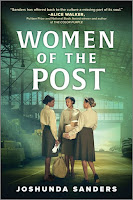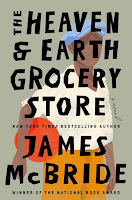Author: Jillian Cantor
Publication Information: Park Row. 2023. 304 pages.
ISBN: 0778310833 / 978-0778310839
Rating: ★★
Book Source: I received this book through NetGalley and a publisher's blog tour free of cost in exchange for an honest review.
Opening Sentence: "Last night I dreamt I went to Malibu again."
Favorite Quote: "That's what writing fiction was, wasn't it? Processing your own life, answering all those questions in any way you wanted to, since fictional worlds operated with their own language and their own rules and their own timelines. They offered their own answers."
***** BLOG TOUR *****
Review
I am drawn in by the title - the fiction writer. As a reader, I love books about books! The description pulls in a classic - Daphne du Maurier's Rebecca. This connection intrigues me further. The main character has written a failed retelling of this classic. She is down on her luck and the project that may save it all has to do with a family's history with and connection to Daphne Du Maurier. The premise of "a captivating story exploring the boundaries of creative freedom and whose stories we have the right to tell" further identifies the potential for this story.
Unfortunately, for me, the story itself falls short of the premise and the build up for a few reasons.
The opening line is an indication that this is more than a book that builds a connection to Daphne Du Maurier's book and history. Rebecca begins with the line, "Last night, I dreamt I went to Manderley again." The exact mirror in this book - "Last night I dreamt I went to Malibu again" - seems to indicate more a retelling than the book description indicates. Unfortunately, retellings have an uphill battle, particularly when pitted against a classic like Rebecca.
Nevertheless, I put that aside and move on, determined to enjoy the story for what it is and not as a comparison. Unfortunately, I struggle with the book. Nothing much happens. This is clearly a book more character driven than plot driven. That being said, the descriptions and actions depicted of the main character do not lend themselves to a protagonist to cheer for. Unfortunately, they also do not lend themselves to a protagonist that is interesting enough in their poor choices to watch and follow just to see what happens.
Olivia is an accomplished, published author whose second and third books are a struggle. The success of her first book led to her distance from some old relationships. Her preoccupation with her lack of current success perhaps contribute to the destruction of current relationships. Yet, somehow, both individuals remain a supportive influence in her life. She is repeatedly shown to be a heavy drinker (entire bottles in a sitting!). For a mature adult, she is also shown to repeatedly ignore the red flags in this situation and the warnings of others:
- "But I had this weird feeling that I shouldn't come back."
- "Something just ... feels off about this whole story."
- "I'd trapped myself inside my own twisted Rebecca retelling..."
- "There are some rich creeps in Malibu."
Given that this is Olivia's story and mostly a first person narrative, the other characters come across as the stereotypes that she view them as. For example, the other main character in the book is Henry "Ash" Asherwood. Yet, the only thing about him that comes across is that he is "a reclusive mega billionaire, twice-named People’s Sexiest Man Alive." Even at the end of the story, it is unclear what exactly happened in the past and what his role was.
These repeated refrains and the lack of much action in this book make it a challenge and make me not the reader for this book.
About the Book
From USA Today-bestselling Jillian Cantor, THE FICTION WRITER follows a mid-list writer hired by a handsome billionaire to write about his family history with Daphne du Maurier and finds herself drawn into a tangled web of obsession, marital secrets, and stolen manuscripts.
Last night I dreamt I went to Malibu again…
The once-rising literary star Olivia Fitzgerald is down on her luck. Her most recent novel--a re-telling of Daphne du Maurier’s Rebecca--was a flop, her boyfriend of nine years just dumped her, and she’s battling a bad case of writer’s block. So when her agent calls her with a high-paying ghostwriting opportunity, Olivia is all too willing to sign the NDA.
At first, the write-for-hire job seems too good to be true. All she has to do is interview Henry “Ash” Asherwood, a reclusive mega billionaire, twice-named People’s Sexiest Man Alive, who wants her help in writing a book that reveals a shocking secret about his late grandmother and Daphne du Maurier. But when Olivia arrives at his Malibu estate, nothing is as it seems. Ash is hesitant to reveal any family secrets, and he seems more interested in her than their writing project. The more Olivia digs into his grandmother’s past, the more questions she has—and before she knows it, she’s trapped in a gothic mystery of her own.
With as many twists and turns as the California coast, The Fiction Writer is a captivating story exploring the boundaries of creative freedom and whose stories we have the right to tell.
Prologue
Last night I dreamt I went to Malibu again.
I stood barefoot on the sand, the cool water nipping at my ankles. And there, high above me, perched on the edge of that magnificent cliff, his stunning house sat as it once had, alive, whole. It had ten bedrooms and was on three private cliffside acres, with a lap pool, a tennis court, and a garden blooming flush with pink and white bougainvillea. But from the beach down below all I could see was its long wall of privacy-tinted glass windows, slanting out toward the sea.
He could see me here, out on the beach. I was certain he could, even in my dream.
He was still behind those windows, watching my every step. Though I couldn’t see him. The glass was one-way. But I imagined him there behind the glass so vividly, it had to be real.
Until it wasn’t. Until the heat from the flames would shatter all the windows, break them apart, send smoke spewing from the piano room, down the cliff, evaporating in wisps into the lonely Pacific.
But in my dream, the flames hadn’t existed yet. Or, maybe they never would. He and his house were there, watching me. Wanting me. Haunting me.
“Come back!” His voice was a desperate echo, my undoing. The smoke was so thick, even out on the beach I couldn’t see, and I couldn’t breathe.
So that’s why I did it, in my dream. I turned away from the house, and I walked into the bone-chilling water. It was so cold, it numbed me, but I walked into the sea, up to my shoulders, my neck, my chin. Until I could no longer smell the smoke or hear his voice.
And then my entire head was underwater, and the tide was strong. It sucked me in, held me there.
But I wasn’t trying to drown. I really wasn’t. I was merely trying to escape the fire.
B&N: https://www.barnesandnoble.com/w/the-fiction-writer-jillian-cantor/1142651719;jsessionid=001769DBDE63E04FD6387C931C6C273E.prodny_store01-atgap14?2sid=HarperCollins%20Publishers%20LLC_7310909_NA&ean=9780778334187&sourceId=AFFHarperCollins%20Publishers%20LLC&st=AFF
Amazon: https://www.amazon.com/dp/077833418X/keywords=gothic?tag=harpercollinsus-20
BAM: https://www.booksamillion.com/p/9780778334187?AID=10747236&PID=7310909&cjdata=MXxOfDB8WXww&cjevent=3a5c07afea2a11ed822801080a82b82c
Apple Books: https://books.apple.com/us/book/the-fiction-writer/id6444363552
Instagram: https://www.instagram.com/jilliancantor
FB: https://www.facebook.com/authorjilliancantor/
Twitter: https://twitter.com/JillianCantor
Goodreads: https://www.goodreads.com/author/show/1651861.Jillian_Cantor
Last night I dreamt I went to Malibu again…
The once-rising literary star Olivia Fitzgerald is down on her luck. Her most recent novel--a re-telling of Daphne du Maurier’s Rebecca--was a flop, her boyfriend of nine years just dumped her, and she’s battling a bad case of writer’s block. So when her agent calls her with a high-paying ghostwriting opportunity, Olivia is all too willing to sign the NDA.
At first, the write-for-hire job seems too good to be true. All she has to do is interview Henry “Ash” Asherwood, a reclusive mega billionaire, twice-named People’s Sexiest Man Alive, who wants her help in writing a book that reveals a shocking secret about his late grandmother and Daphne du Maurier. But when Olivia arrives at his Malibu estate, nothing is as it seems. Ash is hesitant to reveal any family secrets, and he seems more interested in her than their writing project. The more Olivia digs into his grandmother’s past, the more questions she has—and before she knows it, she’s trapped in a gothic mystery of her own.
With as many twists and turns as the California coast, The Fiction Writer is a captivating story exploring the boundaries of creative freedom and whose stories we have the right to tell.
About the Author
Jillian Cantor is the USA Today and internationally bestselling author of eleven novels for teens and adults, which have been chosen for LibraryReads, Indie Next, Amazon Best of the Month, and have been translated into 13 languages. She has a BA in English from Penn State University and an MFA from the University of Arizona. Born and raised in a suburb of Philadelphia, Cantor currently lives in Arizona with her husband and two sons.Excerpt
Excerpted from The Fiction Writer by Jillian Cantor, Copyright © 2023 by Jillian Cantor. Published by Park Row Books.Prologue
Last night I dreamt I went to Malibu again.
I stood barefoot on the sand, the cool water nipping at my ankles. And there, high above me, perched on the edge of that magnificent cliff, his stunning house sat as it once had, alive, whole. It had ten bedrooms and was on three private cliffside acres, with a lap pool, a tennis court, and a garden blooming flush with pink and white bougainvillea. But from the beach down below all I could see was its long wall of privacy-tinted glass windows, slanting out toward the sea.
He could see me here, out on the beach. I was certain he could, even in my dream.
He was still behind those windows, watching my every step. Though I couldn’t see him. The glass was one-way. But I imagined him there behind the glass so vividly, it had to be real.
Until it wasn’t. Until the heat from the flames would shatter all the windows, break them apart, send smoke spewing from the piano room, down the cliff, evaporating in wisps into the lonely Pacific.
But in my dream, the flames hadn’t existed yet. Or, maybe they never would. He and his house were there, watching me. Wanting me. Haunting me.
“Come back!” His voice was a desperate echo, my undoing. The smoke was so thick, even out on the beach I couldn’t see, and I couldn’t breathe.
So that’s why I did it, in my dream. I turned away from the house, and I walked into the bone-chilling water. It was so cold, it numbed me, but I walked into the sea, up to my shoulders, my neck, my chin. Until I could no longer smell the smoke or hear his voice.
And then my entire head was underwater, and the tide was strong. It sucked me in, held me there.
But I wasn’t trying to drown. I really wasn’t. I was merely trying to escape the fire.
Buy Links
Bookshop.org: https://bookshop.org/p/books/the-fiction-writer-original-jillian-cantor/19278291?ean=9780778334187&ref=&source=IndieBound&title=The%20Fiction%20WriterB&N: https://www.barnesandnoble.com/w/the-fiction-writer-jillian-cantor/1142651719;jsessionid=001769DBDE63E04FD6387C931C6C273E.prodny_store01-atgap14?2sid=HarperCollins%20Publishers%20LLC_7310909_NA&ean=9780778334187&sourceId=AFFHarperCollins%20Publishers%20LLC&st=AFF
Amazon: https://www.amazon.com/dp/077833418X/keywords=gothic?tag=harpercollinsus-20
BAM: https://www.booksamillion.com/p/9780778334187?AID=10747236&PID=7310909&cjdata=MXxOfDB8WXww&cjevent=3a5c07afea2a11ed822801080a82b82c
Apple Books: https://books.apple.com/us/book/the-fiction-writer/id6444363552
Social Links
Author website: https://www.jilliancantor.com/Instagram: https://www.instagram.com/jilliancantor
FB: https://www.facebook.com/authorjilliancantor/
Twitter: https://twitter.com/JillianCantor
Goodreads: https://www.goodreads.com/author/show/1651861.Jillian_Cantor
Please share your thoughts and leave a comment. I would love to "talk" to you.






